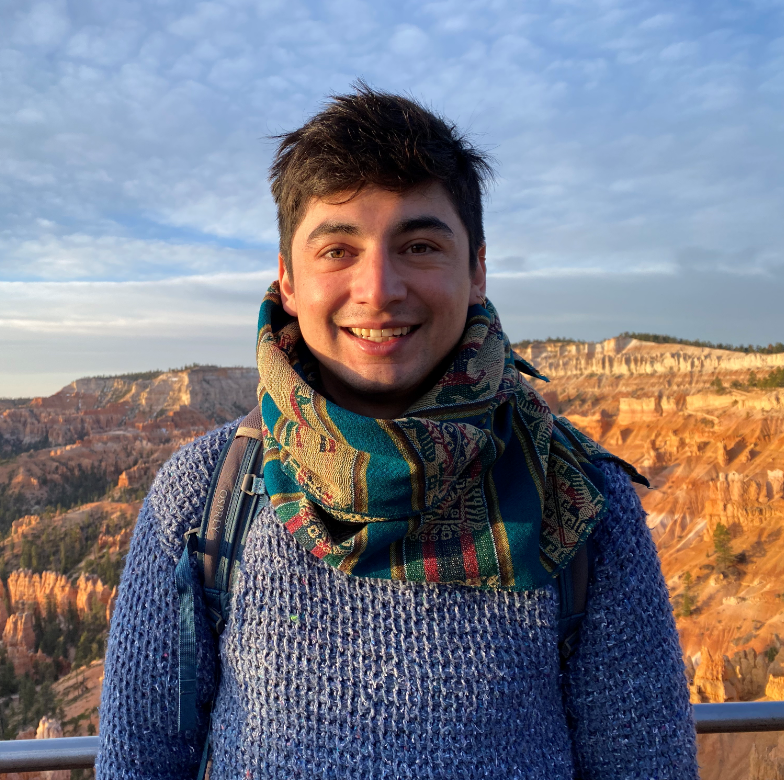ZTF Faces
This section features PhD students, postdocs and young faculty who are part of the global ZTF collaboration.
Tomas Ahumada
PhD student at UMD, USA
Where was your starting point and how did you discover astronomy?
I was born and raised in Santiago, Chile. Over there, you can see the Southern Cross all year round, and it's probably the constellation I miss the most.
I was particularly fascinated with the technology and advancements that astronomy brought to Chile. Growing up, it was common to see astronomical discoveries featured in the news: from new planets to supernova explosions. That's why I decided early on to get a bachelors in astronomy. I completed my undergraduate studies at the Pontificia Universidad Católica de Chile, in Santiago. After a brief internship at Gemini Observatory in the Chilean desert, I moved to the humid east coast of the US. I am currently enrolled in the astronomy PhD program at the University of Maryland.
What are you playing with in the ZTF playground?
During my undergraduate I worked searching for quasars on large optical surveys, and when I started grad school at UMD, I was set on continuing to learn how to manage large databases and sift for interesting sources. That's when my advisor, Dr. Leo Singer, came to advertise his project on looking for gravitational waves and compact binary merger optical counterparts. The project was mainly focused on the use of ZTF, but it also required observations with different telescopes and provided the opportunity to learn a lot about the management of large data sets. That's why I immediately got excited.
Currently, my focus is on using ZTF to hunt for the optical counterpart of short GRBs, thought to come from binary neutron star mergers. We haven't had much luck in that regard, but we have found other interesting objects. Particularly GRB200826A (see Ahumada et. al 2021), which is the shortest GRB coming from a collapsing massive star ever found. I also took part on the search for gravitational waves counterparts lead by Prof. Mansi Kasliwal, and I am currently involved in the search for fast fading transients, showing kilonova behavior using ZTFReST, a pipeline mainly developed by Dr. Igor Androni and Prof. Michael Coughlin.
Where do you want to steer your rocket in the future?
I really enjoy the dynamic of the multi-messenger astronomy group in ZTF. It makes this very exciting field easy to navigate, as it requires a lot of knowledge from different areas and it's very challenging. I would like to keep exploring time-domain astronomy, as the future seems bright with all the new missions and telescopes being built in different parts of the world. So far, MMA has allowed me to create new tools to discover interesting sources and I would love to continue this trip. In the near future I am aiming to complete my thesis work. Eventually and in an ideal world, I'd like to end my days in Chile, maybe as part of an observatory. But baby steps! There is still so much to learn.
If you were not an astronomer, what would you be?
I enjoy exploring the world a lot, and I consider myself a curious person. Then logically some sort of research job that involves traveling to new and unexplored regions sounds very appealing! From the study of microorganisms in Patagonia, to the effect of human activity on the glaciers around the globe, all sounds so interesting! However, I am already hooked with coding, and maybe applying the tools I am already equipped with on data science problems somehow related to these activities would make more sense.
A book that shook your worldview?
Reading is such an adventure! I love getting into the stories and the drama. Although it's hard to mention one book that shook my worldview, the first one that came to my mind is 'El cuaderno de Maya' (Maya's notebook) by Isabel Allende. It's a story of a young american woman that runs away from her problems to the south of Chile. And both the way that the landscapes are described and how she grows into this conscious and selfless being made me, at the time, realize how important self-reflection is. Bonus points as they have an astronomer in the book! 10/10
If you’ve had a bad day at work, you will….
On a bad day, I'd follow my grandma's advice and I'd help myself: it could be a nice cup of tea, a beer with a friend, a call with family, or maybe trying to make non-horrific sounds with my accordion. External support has shown to be essential during this PhD journey and I am very grateful for the people I have surrounded myself with.
